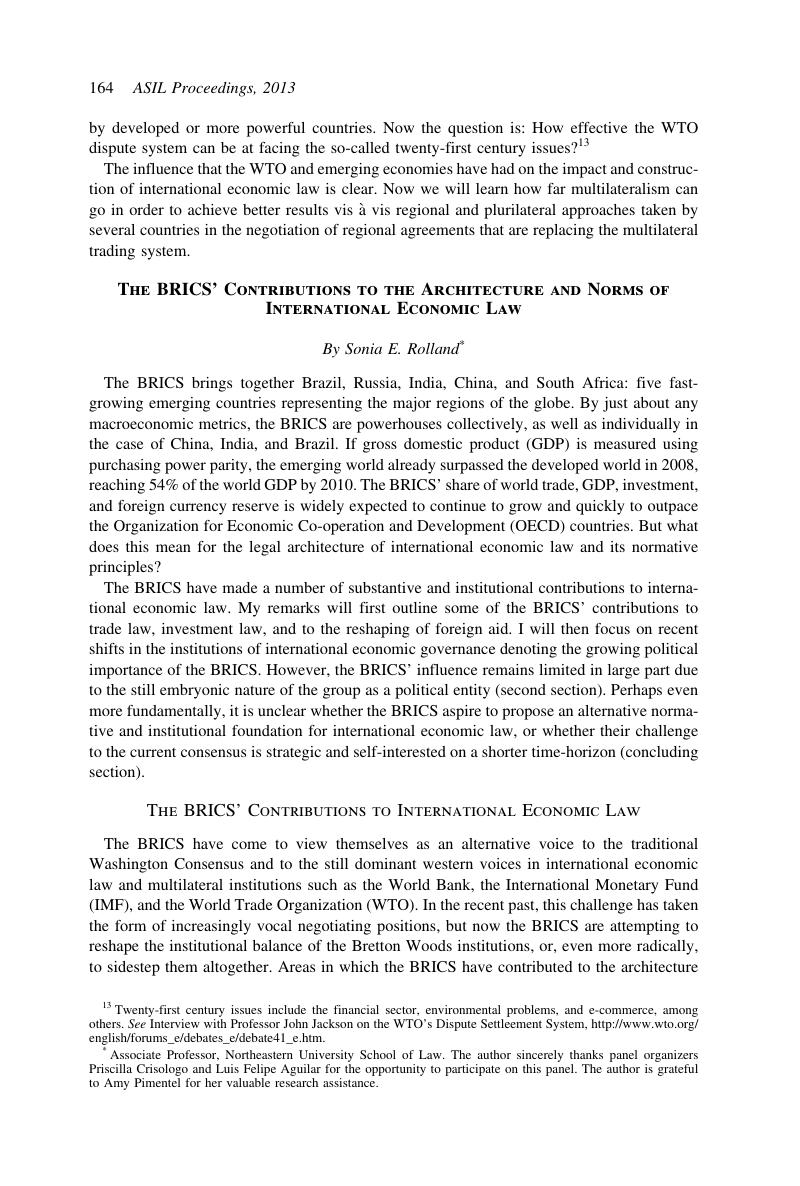Article contents
The BRICS’ Contributions to the Architecture and Norms of International Economic Law
Published online by Cambridge University Press: 20 January 2017
Abstract

- Type
- G20 and Beyond—The Influence of Emerging Countries on the Architecture of International Economic Law
- Information
- Copyright
- Copyright © American Society of International Law 2014
References
1 Trubek, David M., Reversal of Fortune? International Economic Governance, Alternative Development Strategies, and the Rise of the BRICS (June 2012) (unpublished manuscript, presented at the European University Institute)Google Scholar, http://www.law.wisc.edu/facstaff/trubek/eui_paper_finaljune_2012.pdf. There is a growing literature on the BRICS’ influence on international economic law. See, e.g., Paulo Borba Casella & Daniel Florimond, BRIC, Brésil, Russie, Inde, Chine et Afrique du Sud: à l’Heure d’un Nouvel Ordre Juridique International (2011); Julien Vercueil, Les Pays Émergents: Brésil, Russie, Inde, Chine …: Mutations Économiques et Nouveaux Défis (2012).
2 Dispute Settlement at the WTO: The Developing Country Experience (Gregory C. Shaffer & Ricardo Melendez-Ortiz eds., 2010); Shaffer, Gregory C. & Sutton, Charles S., The Rise of Middle-Income Countries in the International Trading System, in Law and Development in Middle Income Countries (Peerenboom, Randall & Ginsburg, Thomas eds., forthcoming)Google Scholar, Minnesota Legal Studies Research Paper No. 12–51, available at http://ssrn.com/abstract=2153911; Santos, Alvaro, Carving Out Policy Autonomy for Developing Countries in the World Trade Organization: The Experience of Brazil and Mexico, 52 Va. J. Int’l L. 551 (2012)Google Scholar.
3 Gu, Ling, Humphrey, John & Messner, Dirk, Global Governance and Developing Countries: The Implications of the Rise of China, 36 World Dev. 274, 285 (2007)CrossRefGoogle Scholar.
4 Wade, Robert, Emerging World Order: From Multipolarity to Multilaterialism in the G20, the World Bank, and the IMF, 39 Pol. & Soc’y 347, 359 (2011)CrossRefGoogle Scholar.
5 WTO 2013 News Items, “Troika Recommends Carvalho de Azevedo to Be the Next WTO Director-General,” http://www.wto.org/english/news_e/news13_e/gc_rpt_08may 13_e.htm.
6 England, Andrew, BRICS Agree to Create Development Bank, Fin. Times (Mar. 27, 2013)Google Scholar, http://www.ft.com/intl/cms/s/0/2bcbd6e0-96e5-11e2-a77c-00144feabdc0.html?ftcamp=ublishedJ_links%2Frss%2Fhome_middleeast%2Ffeed%2F%2Fproduct.
7 Id.
8 PM Hails BRICS’ Decision to Launch Development Bank, Econ. Times (Mar. 28,2013), http://articles.economic-times.indiatimes.com/2013-03-28/news/38099680_l_brics-development-bank-brics-business-council-contingency-reserve-arrangement. See also Tatlow, Didi Kirsten, BRIC, BRICS, or BRICSI? The Growing Challenge, Int’l Herald Trib. (Mar. 28, 2013)Google Scholar, available at http://rendezvous.blogs.nytimes.com/author/didi-kirsten-tatlow/.
9 The BRICs: The Trillion Dollar Club, Economist (Apr. 15, 2010), available at http://www.economist.com/node/15912964.
10 Gumede, William, Complicated Relationship Holds BRICS Back, Mail & Guardian (Mar. 22, 2013)Google Scholar, http://mg.co.za/article/2013-03-22-00-complicated-relationship-holds-brics-back.
11 Id.
12 Julien Bokilo, La Chine en Afrique: La Chine en Concurrence avec les Anciens Partenaires de L’Afrique et les Pays BRICS (2011).
13 Villarreal, Ryan, Will BRICS Pressure Syria on Humanitarian Aid?, Int’l Bus. Times (Apr. 2, 2013)Google Scholar, www.ibtimes.com//will-brics-pressure-syria-humanitarian-aid-1164255#.UVrxbihY6hM.mailto.
14 Brazil has RTAs with 47 countries, Russia with 12 countries, India with 53 countries, China with 20 countries, and South Africa with 16 countries. WTO, Participation in RTAs, http://rtais.wto.org/UI/PublicMaintainRTAHome.aspx.
15 Keeler, Dan, Special Report: BRICS, Global Fin. (Feb. 2012)Google Scholar.
16 O’Neill, Jim, Building Better Global Economic BRICs, Goldman Sachs (NOV. 30, 2001)Google Scholar, http://www.goldman-sachs.com/our-thinking/archive/archive-pdfs/build-better-brics.pdf.
17 Current theoretical literature is also reflecting this reality and seeking alternatives to the universalist paradigm. See, e.g., Frank J. Garcia, Global Justice and International Economic Law—Three Takes (2013).
- 3
- Cited by




